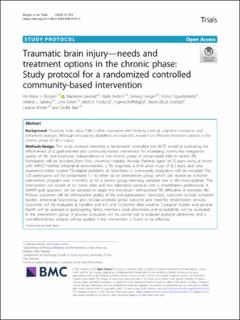| dc.description.abstract | Background
Traumatic brain injury (TBI) is often associated with life-long medical, cognitive, emotional, and behavioral changes. Although long-lasting disabilities are expected, research on effective treatment options in the chronic phase of TBI is scarce.
Methods/design
This study protocol describes a randomized controlled trial (RCT) aimed at evaluating the effectiveness of a goal-oriented and community-based intervention for increasing community integration, quality of life, and functional independence in the chronic phase of complicated mild to severe TBI. Participants will be recruited from Oslo University Hospital, Norway. Patients aged 18–72 years living at home with MRI/CT-verified intracranial abnormalities, a TBI diagnosis, a time since injury of ≥ 2 years, and who experience either current TBI-related problems or restrictions in community integration will be included. The 120 participants will be randomized 1:1 to either (a) an intervention group, which will receive an in-home intervention program over 4 months, or (b) a control group receiving standard care in the municipalities. The intervention will consist of six home visits and two telephone contacts with a rehabilitation professional. A SMART-goal approach will be adopted to target the individual’s self-reported TBI difficulties in everyday life. Primary outcomes will be self-reported quality of life and participation. Secondary outcomes include symptom burden, emotional functioning, and clinician-assessed global outcome and need for rehabilitation services. Outcomes will be evaluated at baseline and 4–5 and 12 months after baseline. Caregiver burden and general health will be assessed in participating family members. Goal attainment and acceptability will be evaluated in the intervention group. A process evaluation will be carried out to evaluate protocol adherence, and a cost-effectiveness analysis will be applied if the intervention is found to be effective.
Discussion
The current study provides an innovative approach to rehabilitation in the chronic phase of TBI evaluated using an RCT design that may inform treatment planning, health policies, and coordination of patient care. Further, the study may demonstrate new modes of establishing collaboration and knowledge transition between specialized rehabilitation facilities and local rehabilitation services that may improve patient outcomes. | en_US |

